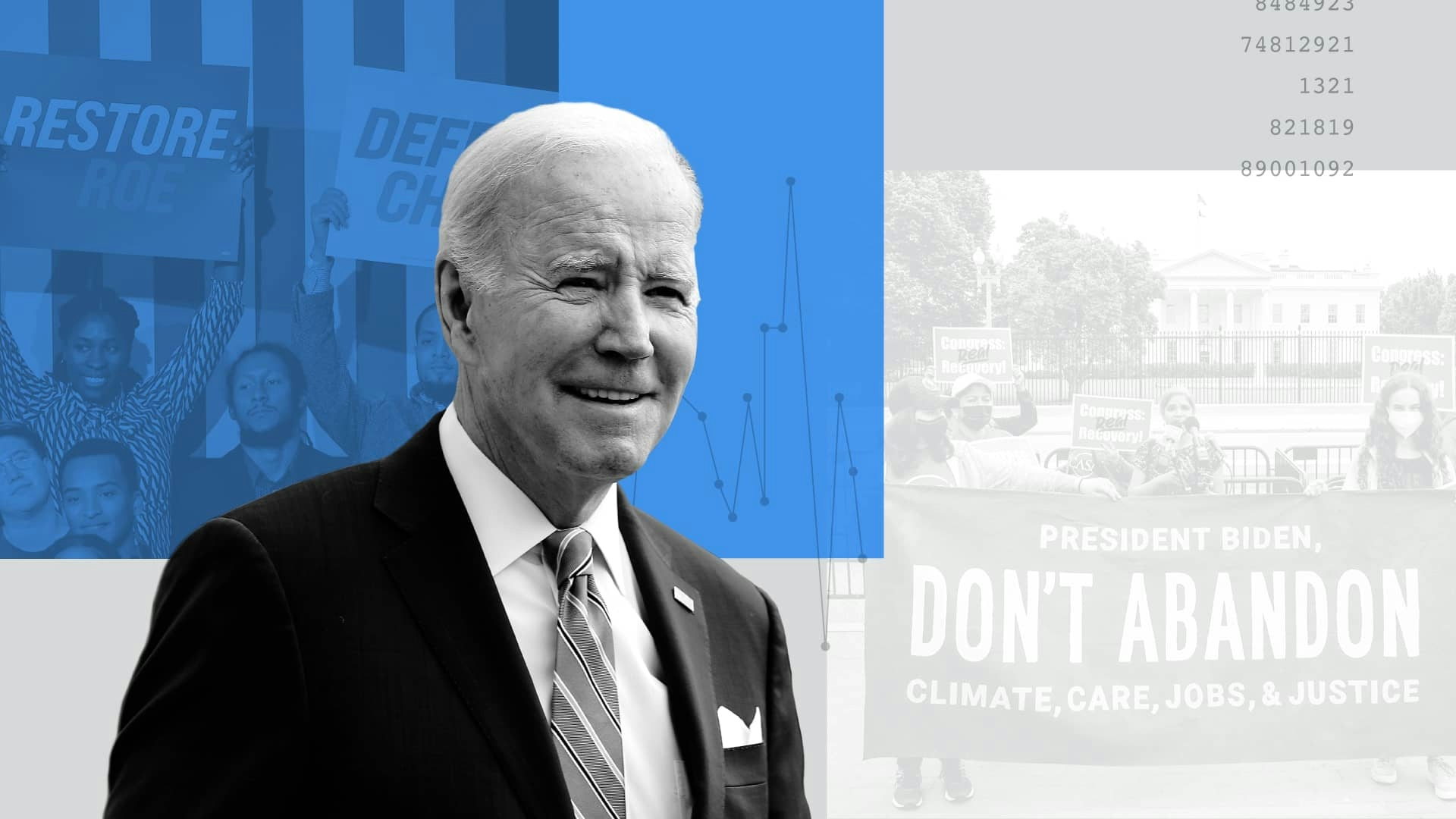Voters Increasingly Favor Biden’s Handling of the Israeli-Palestinian Conflict
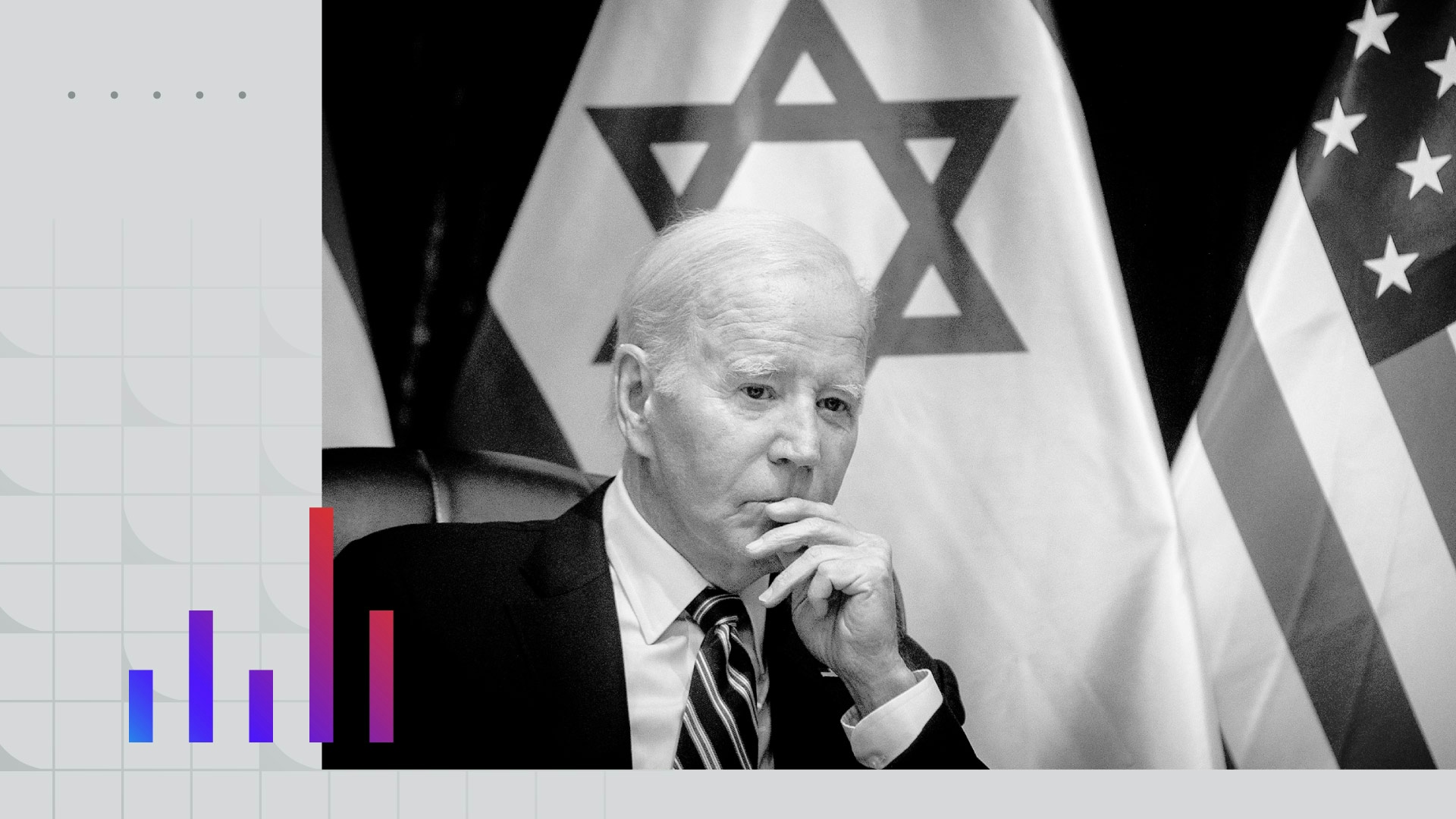
Key Takeaways
Voters are about as likely to approve of President Joe Biden’s handling of the Israeli-Palestinian conflict than they are to disapprove of it (42% to 43%), marking an improvement since our first survey conducted after Hamas launched a mass terrorist attack in early October.
Since earlier this month, the share of voters who said they are equally sympathetic with the Israelis and the Palestinians has increased from 26% to 31%, including a 9-percentage-point increase among Democratic voters, following a highly salient blast at a Gaza hospital.
Biden’s plan to link funding for Israel and Ukraine faces an uphill climb with voters. A plurality (47%) support his $14 billion funding request to help Israel’s military, compared with a near-equal plurality (46%) who oppose Congress' approving of the $60 billion he is seeking to help Ukraine fend off Russia’s invasion.
Sign up to get the latest data and analysis on how business, politics and economics intersect around the world.
More than two weeks into Israel’s war with Hamas, voters are becoming more fond of President Joe Biden’s handling of the broader conflict. But as their awareness of the latest war increases, our new survey shows the public is becoming more likely to sympathize with both Israelis and Palestinians equally as the White House is pressing Congress to approve more military aid for Israel and address a range of other global issues.
Approval of Biden’s Handling of the Israeli-Palestinian Conflict Is on the Rise
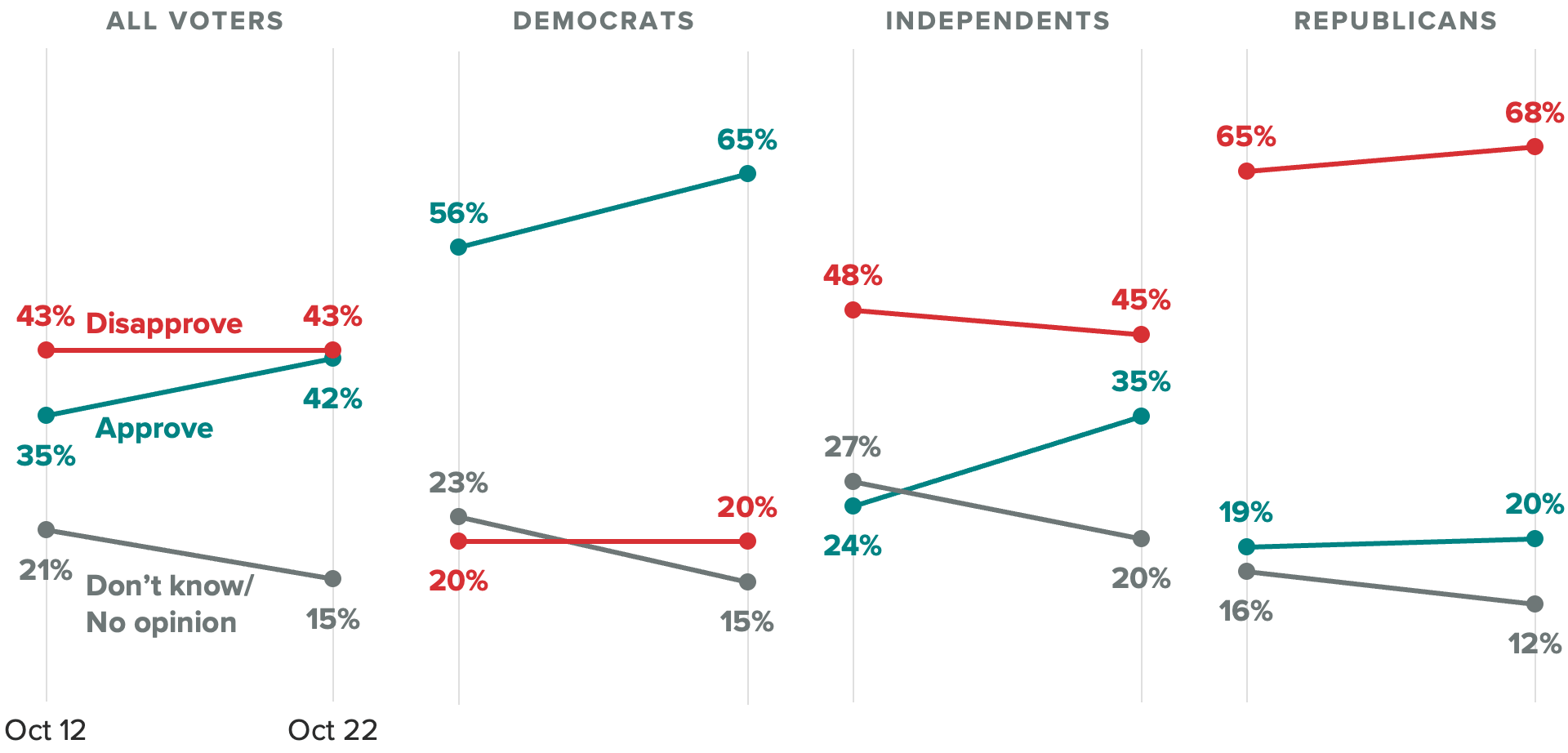
Voters are about as likely to approve of Biden’s handling of the conflict than they are to disapprove of it (42% to 43%), according to our Oct. 19-22 survey. This marks an improvement since our first survey conducted just after Hamas launched a mass terrorist attack on Oct. 7, driven by gains among both Democrats and independents — though sentiment remains underwater among voters not aligned with either major party.
At least 3 in 5 voters reported hearing at least “some” about Biden’s visit to Tel Aviv and his prime-time address in which he unveiled a roughly $105 billion spending package to aid Israel and Ukraine, according to our survey data. In his speech, Biden made the case for supporting Israel as it fights Hamas terrorists but also expressed care for Palestinian civilians, saying that “Hamas does not represent the Palestinian people.”
While the Israelis continue to garner the bulk of the public’s sympathy driven by solid backing among Republicans, our surveys show that more voters have begun to say they sympathize with both Israelis and Palestinians equally as the war has developed.
Democrats and Independents Are Becoming More Likely to Sympathize With Both Israelis and Palestinians Equally
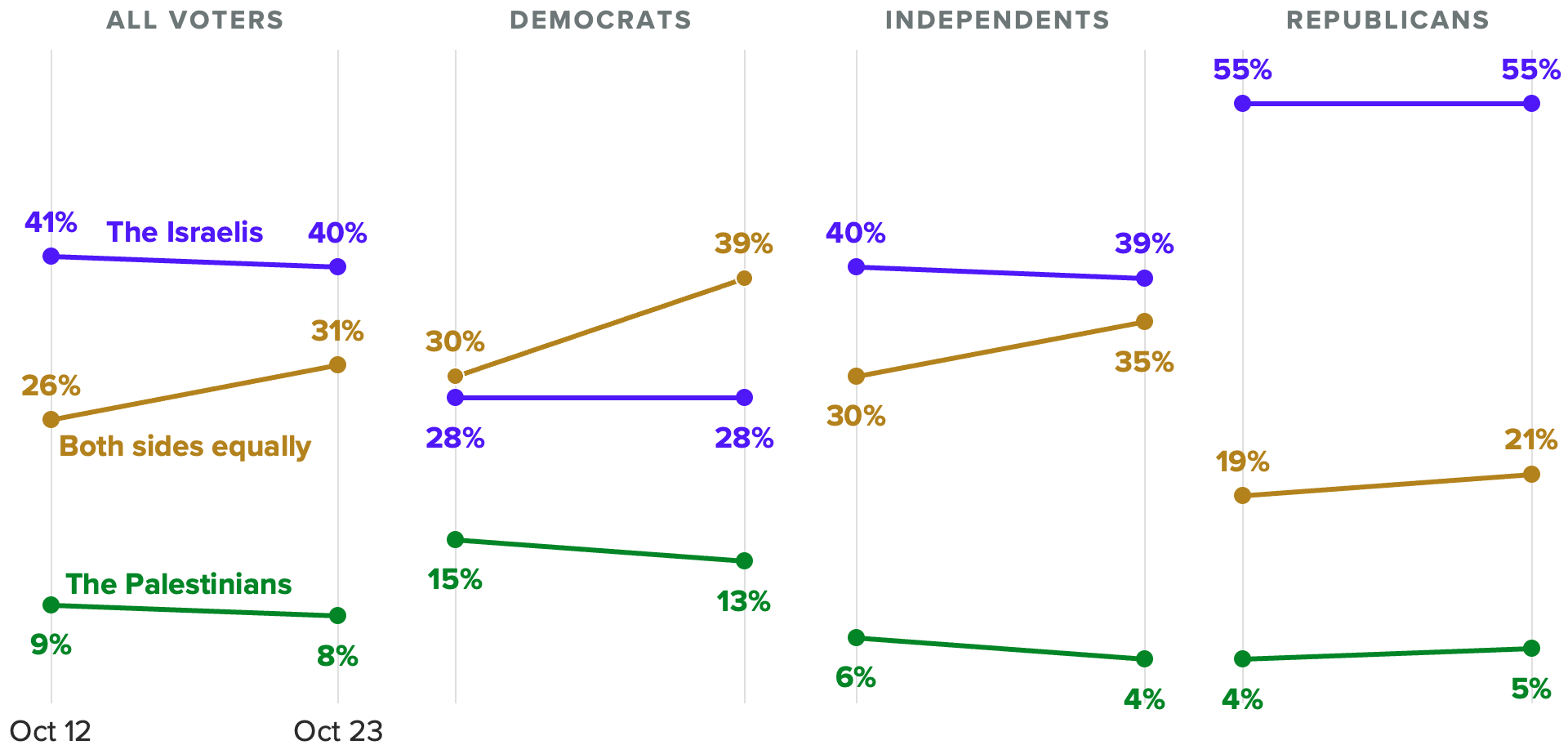
According to our Oct. 21-23 survey, 2 in 5 voters said they are more sympathetic toward the Israelis, compared with 8% who said the same of the Palestinians. Both figures are virtually unchanged since our early October survey.
However, over that period, the share who said they are equally sympathetic for both sides increased from 26% to 31%, including a 9-percentage-point increase among Democrats. This increase in empathy for both sides may be attributable to high awareness of a deadly blast at a hospital in the Gaza Strip, whose perpetrator was contested as news of the event was breaking through to the American public.
Specific demographics at scale: Surveying thousands of consumers around the world every day powers our ability to examine and analyze perceptions and habits of more specific demographics at scale, like those featured here.
Why it matters: Leaders need a better understanding of their audiences when making key decisions. Our comprehensive approach to understanding audience profiles complements the “who” of demographics and the “what” of behavioral data with critical insights and analysis on the “why.”
Voters’ views of Biden’s Israel-Ukraine spending package
During Biden’s prime-time address, he sought to tie the American response to the conflict between Israel and Hamas to the one between Ukraine and Russia as he continues his strenuous pitch for Congress to maintain Washington’s financial backing of Kyiv’s war effort.
Due to partisan divisions over Ukraine — an issue that has splintered Republicans on the campaign trail and on Capitol Hill — our data suggests the president will have a tough time selling the voting public on his package deal, particularly as GOP voters’ support for isolationism reaches an all-time high.
Border Security Funding Is More Popular Than Aid to Israel and Ukraine
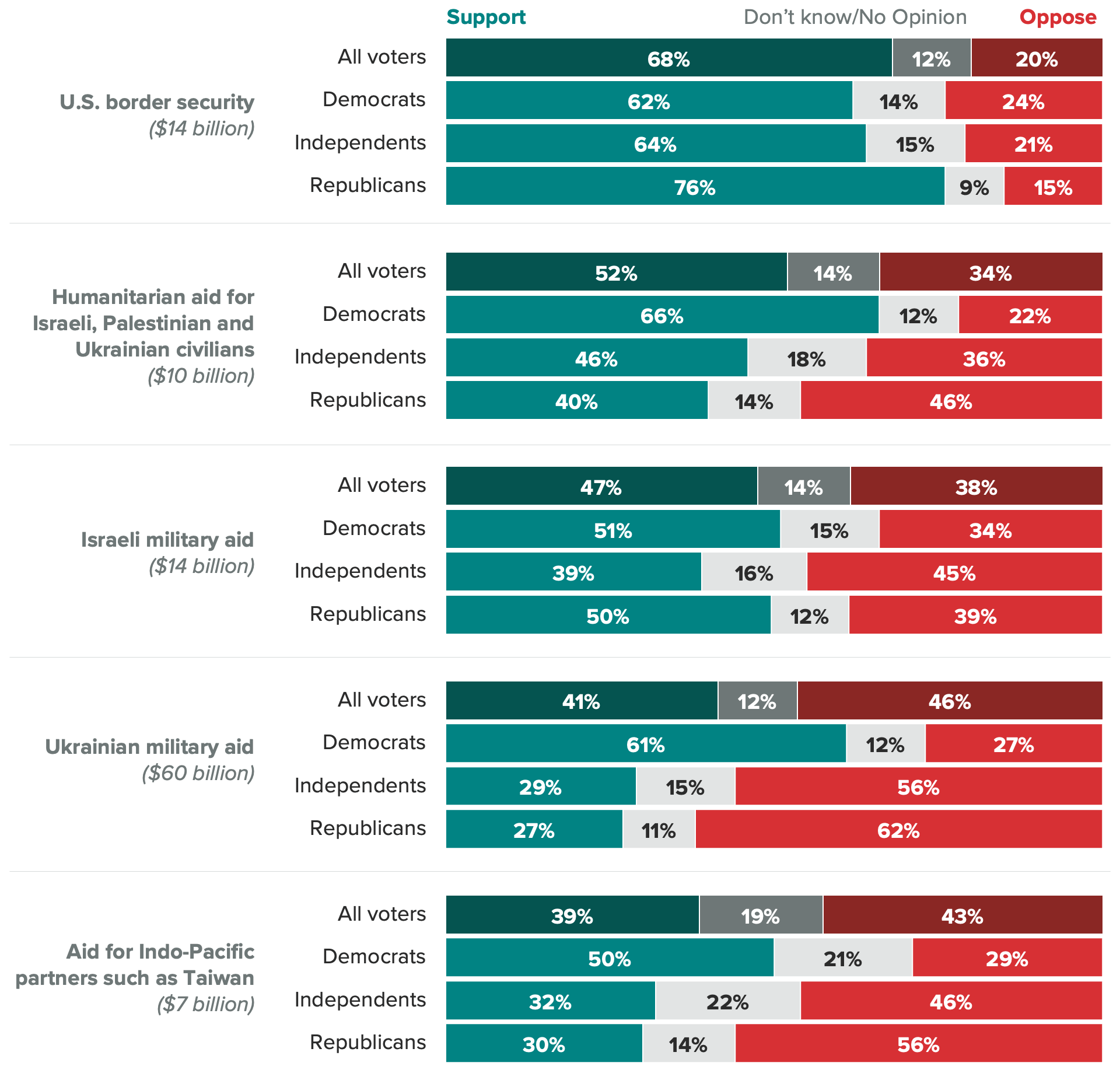
The bulk of voters (47%) support Biden’s $14 billion funding request to help Israel’s military, compared with a similar plurality (46%) who oppose Congress' approving of the $60 billion he is seeking to boost Ukraine’s response to Russia’s invasion. While similar shares of Democrats and Republicans back the money for Israel, Democrats are almost as likely to support funding for Ukraine (61%) as GOP voters are to oppose it (62%).
And while a 52% majority of voters support Biden’s $10 billion request for humanitarian assistance, the survey shows that the president has yet to convince the public of why they should back his request to bolster partners in the Indo-Pacific region such as Taiwan.
The biggest unifier in Biden’s emergency supplemental spending request is money to fund U.S. border security, which is backed by 68% of voters — including 62% of Democrats and 76% of Republicans.
The bottom line
Our data reveals that while the public is generally in line with the president’s approach to Israel, his prime-time address did nothing to change weak public interest in helping Ukraine, which has dipped notably since the start of Russia’s invasion in February 2022. While Biden’s proposed border money is a good carrot to Republican lawmakers, there is very little pressure from the GOP’s influential base to send more money to Kyiv, imperiling the White House’s efforts ahead of next month’s government funding deadline, even setting aside the House speaker fight.
When it comes to Israel, the data also suggests a challenge for the country as it responds to Hamas’ attack and reportedly plots a ground invasion of Gaza. After two weeks of news coverage featuring deadly airstrikes and a mass humanitarian crisis in Gaza, our data reveals the American public is becoming more willing to express sympathy for the Palestinian people too. If Israeli forces are blamed for mass civilian deaths in Gaza, this could shake the American people’s support for the country, or at least complicate it, at a time when Israel may need it more than ever before.
Eli Yokley is Morning Consult’s U.S. politics analyst. Eli joined Morning Consult in 2016 from Roll Call, where he reported on House and Senate campaigns after five years of covering state-level politics in the Show Me State while studying at the University of Missouri in Columbia, including contributions to The New York Times, Politico and The Daily Beast. Follow him on Twitter @eyokley. Interested in connecting with Eli to discuss his analysis or for a media engagement or speaking opportunity? Email [email protected].
Related content

Americans’ Sympathies Shift Toward Israel Following Hamas Terrorist Attack

Americans Prefer Companies Send Aid — Not Just Make Statements — in Response to Hamas’ Attacks
